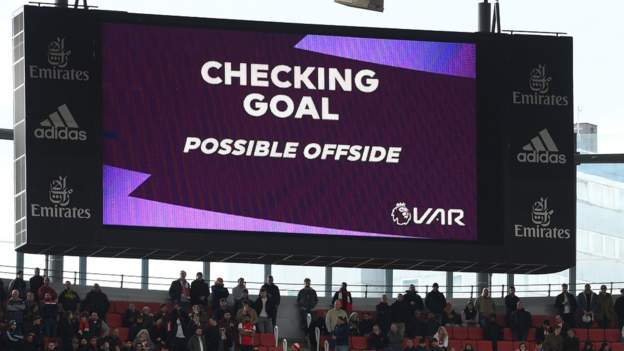Football
Semi-automated offside technology approved by clubs

Premier League clubs have approved unanimously the use of semi-automated offside technology (SAOT) for the 2024-25 season.
The plan is to introduce the system after one of the international breaks in September or October, the Premier League said.
Fifa first used the technology at the 2022 men’s World Cup in Qatar.
It is anticipated SAOT could cut the length of a video assistant referee (VAR) check for offside by 31 seconds.
In a statement, the Premier League said the state-of-the-art technology “will provide quicker and consistent placement of the virtual offside line, based on optical player tracking”.
It also added SAOT “will produce high-quality broadcast graphics to ensure an enhanced in-stadium and broadcast experience for supporters”.
One aim is to introduce the technology next season for FA Cup ties hosted by Premier League clubs, and for the semi-finals and final at Wembley Stadium.
Decisions as to whether a player in an offside position is interfering with play, or whether a player is onside where a defensive player has touched the ball and the contact has been deemed deliberate, will still begin subjectively with the on-field referee.
The system was also trialled at the 2021 Arab Cup and Club World Cup, where it was estimated to have reduced the time taken to make offside VAR decisions from 70 to 25 seconds.
The use of VAR for offside calls has continued to be a controversial subject in the top flight, with a number of high-profile incidents dominating the headlines in recent seasons.
In September, a breakdown in communication led to VAR failing to overturn an incorrect decision to disallow a Luis Diaz’s goal for offside during Liverpool’s 2-1 defeat at Tottenham.
Analysis
Simon Stone, BBC Sport chief football news reporter
It has been a source of frustration for some that semi-automated technology has not been available in the Premier League this season given it is used in the Champions League as well as Fifa competitions.
League officials are stressing the technology, which has been tested and analysed during the current campaign, will not eliminate delays – but it should provide quicker decisions, particularly on the marginal calls, which seem to take forever at the moment.
The average reduction, it is being claimed, will be 31 seconds.
As with goalline technology, it should also mean clubs have greater confidence in decision making and that no offsides are missed.
While everyone connected with the game has come to understand nothing can be 100% perfect, it should reduce the potential for mistakes. However, the current manual crosshair placement will remain available as a backup in event of SAOT failure.












